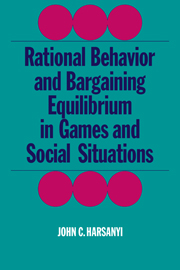Book contents
- Frontmatter
- Contents
- Preface
- Part 1 Preliminaries
- 1 Bargaining-equilibrium analysis: a new approach to game theory and to the analysis of social behavior
- 2 Rational-choice models of social behavior
- 3 Rational behavior under certainty, risk, and uncertainty
- 4 Morality and social welfare
- Part II General principles
- Part III Solutions for specific classes of games
- Notes
- References
- Index
4 - Morality and social welfare
Published online by Cambridge University Press: 24 November 2009
- Frontmatter
- Contents
- Preface
- Part 1 Preliminaries
- 1 Bargaining-equilibrium analysis: a new approach to game theory and to the analysis of social behavior
- 2 Rational-choice models of social behavior
- 3 Rational behavior under certainty, risk, and uncertainty
- 4 Morality and social welfare
- Part II General principles
- Part III Solutions for specific classes of games
- Notes
- References
- Index
Summary
CONSTRUCTIVE APPROACH
Disregard of one's personal identity – a model for moral value judgments
In Section 1.3 we divided the general theory of rational behavior into individual decision theory, ethics, and game theory. In Chapter 3 we summarized the main results of individual decision theory, following Debreu [1959], Herstein and Milnor [1953], and Anscombe and Aumann [1963]. In this chapter we will review the main results of our own work in ethics and will discuss a related result by Fleming [cf. Harsanyi, 1953,1955, and 1958; Fleming, 1952]. Most of these results were originally developed for the purposes of welfare economics but will be discussed here from a more general ethical point of view. The remaining chapters of this book will deal with game theory.
People often take a friendly (positive) or an unfriendly (negative) interest in other people's well-being. Technically this means that the utility function of a given individual i may assign positive or negative utility to the utility level as such of some other individuals j, or to the objective economic, social, biological, and other conditions determining the latter's utility levels. The question naturally arises: What factors will decide the relative importance that any given individual's utility function will assign to the well-being of various other individuals or social groups? We have called this question the problem of dominant loyalties (Section 2.3). This question obviously requires a rather complicated answer.
- Type
- Chapter
- Information
- Publisher: Cambridge University PressPrint publication year: 1977
- 2
- Cited by

